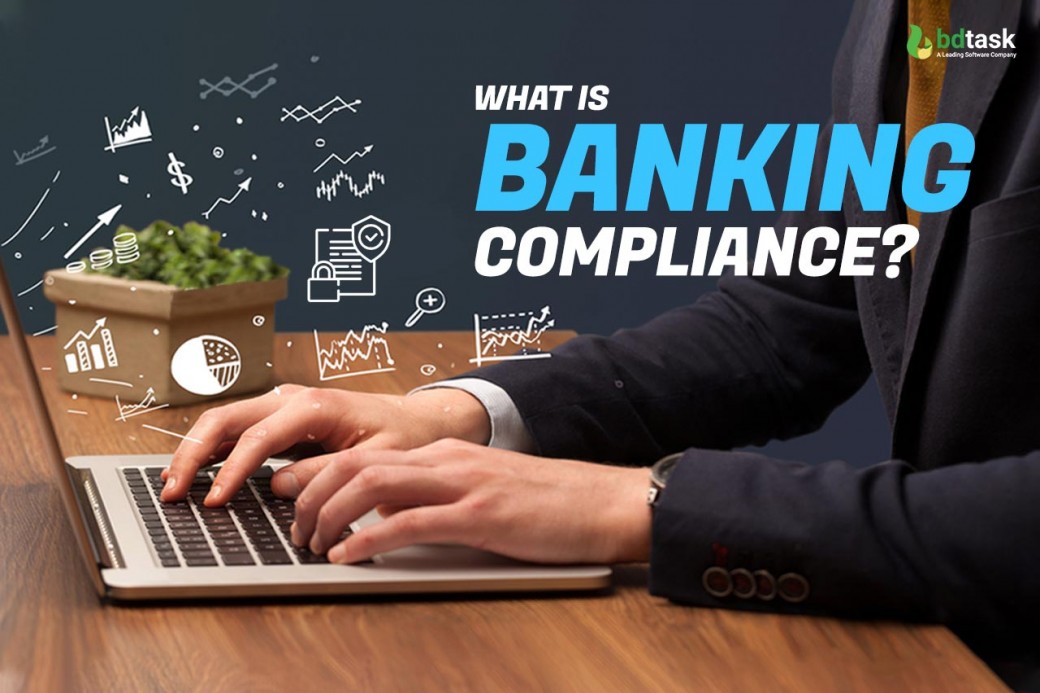What is Banking Compliance: A Complete Guideline [2025]

Today’s digital age has brought a new focus on innovation, efficiency and speed. Consequently, banking is no longer limited to the paper-on-bank processes. We know,
A bank is the premier organization of any country.
The whole country financially depends on it for dealing. Banking is a complex process. So, banks must implement and follow the laws, rules and full instructions regulators have decided to follow. One of these instructions is that banking Compliance is supreme. Before implementing banking compliance, you should first know well about banking compliance. Because,
Banking compliance is a core responsibility of a bank.
So, bank authorities should know what is banking compliance in detail. This blog will briefly demonstrate what is banking compliance, its role, compliance, and risks.
What is Banking Compliance?
Banking compliance directs a group of regulatory laws, rules, and policies that financial institutions must comply with to confirm their operations are lawful, ethical, and secured internally and externally.
Compliance services for banks are all about avoiding or minimizing administrative and financial losses. These actions help prevent illegitimate activities like money laundering, tax evasion, and other actions outside the legal and ethical compulsions of banking compliance.
Types of Compliance in Banks
Regulatory compliance in the banking sector should be straightforward & applicable to all organizations. Organizations must adhere to compliance rules and laws to manage their operating systems.
But the question is, how do all organizations follow the same compliance regulations? The ultimate solution to this question is knowing the banking compliance types well.
Here are the types of regulatory banking compliance below:
- Risk Identify & Management
The main aim of banking compliance is to identify and evaluate all the possible risks a bank could face.
- Prevent Money Laundering
The bank compliance department monitors and analyzes the customer's transactions to identify fraudulent money moves.
- Data Security & Protection
The compliance department ensures the data security and protection of banks and clients so that these can not be misused.
- Prevent Tax Evasion
The bank compliance team verifies whether clients use unethical practices to avoid paying taxes.
- Controlling Internal System
This team enforce an ethical code with legal and regulatory obligations and trains employees on that to develop a system for reporting. It also minimizes the non-compliance work within the bank compliance culture.
Banking compliance has a significant impact on all operating systems of banks. The emerging new processes like policies, legislation, guidelines, and banking compliance ensure banks have more efficiency in operations.
Importance of Compliance in Banking Industry
Regulatory compliance in the banking sector is essential to completely protect banking operations and reputation. If regularity compliance is effectively executed, it can build strong customer relationships. On the contrary, neglecting it may result in financial losses and a deteriorated reputation.
- The benefit of compliance in the finance industry and banking is to prevent illegal deviations. Then, this section provides solutions for these problems and other issues within banking operations.
- Regulatory compliance in the banking sector developed to apply in many sections of any bank, such as,
- Data liability
- Ethical administration
- Risk assessment
- Risk management
- Information Processing
- Banking Compliance has a strong influence as an advisory strategy on the banking process and employees. It involves employees in developing policies and procedures to ensure their practicality and applicability.
However, after complying with guidance, legislation, and policies, the bank will be more efficient in risk detection and prevention.
Roles and Responsibilities of the Compliance Department in Banking
The banking industry is considered at high risk for cyber security, so the banking compliance department plays a responsible role in the banking system. Now, what does compliance do in a bank? The responsibility of this department is to adhere to all relevant laws, regulations and industry standards, such as,
- Policy Development
- Supervisory technology
- Cybersecurity & data security
- Monitoring and enforcing compliance
- Conducting regular risk assessments
- Providing guidance and training to employees
- Reporting and continuous improvement
- Data protection and Consumer protection
- Prevent Money laundering and Tax evasion
- Regularity updates and safeguarding the bank
- Implementing and developing compliance policies
Besides staying updated on laws and regulations, the banking compliance department manages and protects the bank organization as a safeguard. Moreover, it establishes the general policies while the bank management establishes the enterprise's compliance culture.
Compliance risk in banking: Definition & Types of compliance risks
Compliance risk in banking can be defined as financial losses, regulatory sanctions or damages to reputation that may be created from the failure of banking laws, regulations and standards. Moreover, these risks include theft, fraud, money laundering, bribery, violation of privacy law, hacking and malware risks in banks.
A well-developed bank compliance management system should implement policies and procedures to comply with applicable laws and regulations. Hence, regularly checking and monitoring the bank’s potential compliance issues and risks is a must. Here are some common sectors of risk and compliance in the banking industry,
- Credit Risk
- Operational Risk
- Market Risk
- Liquidity Risk
- Reputation Risk
- Interest Risk
- Legal & Compliance Risk
- Model Risk
- Strategic Risk
- Country & Sovereign Risk
Types of Compliance Risks in Banks
Financial organizations are more tend to fail at compliance risks. That is why banks are exposed to a variety of compliance risks. These compliance risks can lead the bank to lose revenue, reputation and value of business opportunities.
Here are some types of compliance risks in banks:
- Lack of Monitoring
Compliance regulations strongly recommend data monitoring so the administration can quickly identify threats. Therefore, compliance officers can get alert to take action to stop or reduce the severity of brach and subsequent fines.
- Data Privacy & Cybersecurity Infraction
The absence of robust cyber security protection and internal data control can lead to banks at high risk—for example, potential data breaches, financial fraud, and endangerment of confidential customer information.
- Human Corruption & Illegal Process
If employees are not trained on common cyber threats, banking data is at high risk of phishing and social engineering attacks. Besides, corruption in banking can also lead to illegal practices, for instance, theft, bribery, money laundering, fraud, etc.
- Customer Due Diligence (CDD) Failures
A bank's failure to adequately verify customers' authentic identities can expose the rise of risk in banks. Inaccurate client identification, financial transactions, business activities, poor record-keeping, and lack of monitoring are the common causes of CDD failures.
- Consumer Protection Breaches
Banks should deal honestly with customers to avoid consumer compliance risks. The Bank compliance officer's duties and responsibilities are to check the bank's financial services, deceptive practices, cause of consumer harm, unfair fees or other forms of mistreatment. Besides, customers should get notifications about new products and services.
- Anti-Money Laundering Violation
AML compliance refers to a process of regulations, technological solutions and other initiatives to combat money laundering efforts and keep illegitimate cash from entering legitimate financial flows. According to money laundering statistics of 2024, the estimated amount of money laundered is almost 5% or $800 billion of the annual global GDP
- Misconfiguration & Insufficient Storage
Any misconfiguration can tend to severe data breaches. Compliance management should test the whole configuration before any deployment in the system. Moreover, sensitive data should be encrypted.
However, the bank compliance management system should establish an effective risk control system. Besides, they can train employees about compliance responsibilities to improve the effectiveness of the ultimate banking compliance process.
How to Improve Compliance Culture in Banks
Compliance Culture in banks requires documentation of rules and regulations, practices, comprehensive training for employees, constant communication in changes of laws and regulations, reporting ethical concerns and many more. It involves international financial standards along with local laws covering every aspect of operations like transactions, business and hiring processes.
Here is how banks can improve compliance culture in banks:
- Make a System for independent and internal audits
You can launch an ERP system for your bank to complete the operating process by automation. Further, establish an anonymous reporting system so that employees don’t hesitate to report any misconduct. Therefore, a solid reporting system can improve the whole compliance system of an organization.
- Audit documenting policies and processes
You can audit policies, regulations, reports and training of your institution. Besides, the important task for you is to document important regulations, rules and processes in your notebook. This documentation helps to improve a compliance culture in your organization.
- Ensuring Employees know relevant laws and rules
You must ensure that your employees are complying with new rules and regulations. Once they have understood compliance, they take the responsibility of conducting new regulations in their jobs.
- Comprehensive Training and Education
Implement a compliance culture in your employees’s comprehensive training program covering policies and ethical standards. Offer constant refresh education and training sessions with updated compliance requirements.
- Constant communication of new changes in laws & regulations
It is a significant rule for compliance culture to follow new compliance rules & regulations constantly. If you fail to introduce employees to new rules & regulations, your institution may face several risks of non-compliance.
However, when you want to improve your compliance culture in banks, consider the above points. Furthermore, try to create a strong partnership between the Compliance team and bank employees to align the goal of a compliance culture.
How to Become a Compliance Officer in a Bank
It is essential to discuss how to become a compliance officer with what is banking compliance topic. A compliance officer is a crucial part of banking compliance. Moreover, a compliance officer is in charge of advising compliance culture in banks.
What is a Compliance Officer: Bank Compliance Officer Duties and Responsibilities
The compliance officer is a general employee of the firm “Compliance Department”. Usually, the head compliance officer is the head of this department. Now, the question is.
What is a Compliance Officer?
A compliance officer is an employee of a company who ensures that the organization adheres to internal and external regulations, laws, legal requirements, policies and so on.
Bank Compliance Officer Duties and Responsibilities:
The role of a compliance officer in a financial institution is crucial for conducting a compliance banking management system. Here are some banking compliance officer roles in banks:
- Monitoring Compliance: Compliance officers ensure the bank complies with internal policies, outside regulations, and legitimate requirements and bylaws.
- Identify risk & apply policies: Compliance officers must have appropriate disciplinary measures for a regulatory breach to avoid a future recurrence.
- Train Employees: Compliance officers work and collaborate with management and staff to manage and identify regulatory risks.
Step-by-Step to Become a Banking Compliance Officer:
The compliance officer role covers numerous industries along with banking. To be a banking compliance officer, you need to follow some steps,
- Focus on your Career Preferences First
- Complete your Bachelor's Degree
- Think about your Master's Degree
- Search for free banking compliance training
- Gain Work experience through Internships and Jobs
- Build and Develop Compliance Officer Skills
- Pursue banking compliance certification
- Search for Relevant Jobs
- Apply for a Job in a Financial Institution
However, the compliance officer is responsible for reporting and investigating any occurrence of non-compliance and managing regulatory relations.
The Verdict
Banking Institutions need to realize what is banking compliance and its impact. Furthermore, banks should use enterprise resource planning (ERP) systems to stay updated with the changes in rules & regulations.
Therefore, the future of compliance in banking will involve new regulations with financial technology. Banking compliance is ever-evolving so, a compliance department should embrace technology, conduct regular checks, and stay up-to-date with new regulatory rules and policies.











